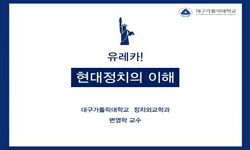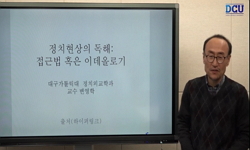However hard a poet may cry out 'art for art's sake', art works are likely to be evaluated by the political surroundings: a poet is very likely to represent the class he belongs to and to react to the political situation through his own works. A poet ...
http://chineseinput.net/에서 pinyin(병음)방식으로 중국어를 변환할 수 있습니다.
변환된 중국어를 복사하여 사용하시면 됩니다.
- 中文 을 입력하시려면 zhongwen을 입력하시고 space를누르시면됩니다.
- 北京 을 입력하시려면 beijing을 입력하시고 space를 누르시면 됩니다.
https://www.riss.kr/link?id=A82610615
- 저자
- 발행기관
- 학술지명
- 권호사항
-
발행연도
2004
-
작성언어
Korean
- 주제어
-
KDC
840
-
등재정보
KCI등재
-
자료형태
학술저널
-
수록면
197-213(17쪽)
- 제공처
-
0
상세조회 -
0
다운로드
부가정보
다국어 초록 (Multilingual Abstract)
However hard a poet may cry out 'art for art's sake', art works are likely to be evaluated by the political surroundings: a poet is very likely to represent the class he belongs to and to react to the political situation through his own works. A poet who suffers from the turmoil of the transitional period can be a victim of the period in the sense that he can be evaluated irrespective of the real value of his works. This paper is motivated by our current social phenomena that the fanatical nationalism to evacuate the past is also applied to the work of reevaluating writers of the past as well as of the present; interestingly, the same situation happened to Yeats. This paper starts with some hypothesis that the primary reason for the lower reevaluation of Yeats since the birth of Free State until its rebirth as a member of E.U. is that he belonged to the Anglo-Irish Ascendancy. And then this paper investigates identity and contribution of the Anglo-Irish to Irish history. And finally this paper tries to find out how Yeats reacted to the radical change of hegemony especially after Responsibilities. The investigation into his poems leads us to the conviction that in his first stage, he wanted to surrender his half-blooded Englishness to his another half-blooded Irishness. This explains why he tried to dig up the ancient Gaelic culture and to advocate the Gaelic Catholic in his first stage. However we can witness his changing attitude after the Easter Rising: some threat from the majority Catholic fanaticism awakened Yeats's self-recognition as an Anglo-Irish, advocating their class and culture in his poems since Responsibilities. It follows that although Yeats wanted to be an artist for art as such, he could not but seek for reconciliation of two aspects of Ireland, -that is, its religion and ethnicity. Yeats's poetry reflects the shift in the political hegemony and the definition of the Irish identity. My conclusion is as follows. The main reason Yeats's evaluation was going down during the period Ireland was being established as a republic country is that he belonged to the Anglo-Irish Ascendancy, the past power group. Through Yeats's poems we can witness the decline and agony of the Anglo-Irish during the birth of Republic of Ireland. Therefore the historical contribution of the Anglo-Irish is to be reevaluated; Yeats's Literary Revival is also referred to as a cracked mirror of the servant. By reading again Yeats's poems from the new perspective towards Yeats as an Anglo-Irish, we can see that Yeats's advocacy of the Anglo-Irish was made only after he was threatened by the fanatical Catholic nationalism and that he adhered to the reconciliation of the divided Ireland throughout his life. Meanwhile, this study leads to another question: Is it possible that the art is free from the political pressure or turmoil? In my opinion, although art is not free from that situation, it can only survive when it shines in the filthy tide, searching for the independence and freedom. I think W.B. Yeats is an example.
동일학술지(권/호) 다른 논문
-
문학과 성, 그리고 정치: 예이츠의 초기 시를 중심으로
- 한국예이츠학회
- 윤정묵
- 2004
- KCI등재
-
- 한국예이츠학회
- 김철수
- 2004
- KCI등재
-
- 한국예이츠학회
- 우철환
- 2004
- KCI등재
-
예이츠의 『달의 친절한 침묵을 통하여』 에 나타난 반자아
- 한국예이츠학회
- 서혜숙
- 2004
- KCI등재





 KCI
KCI 코리아스칼라
코리아스칼라



